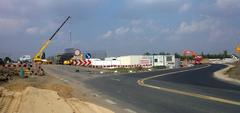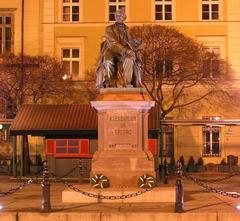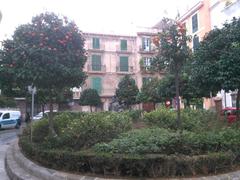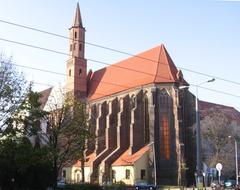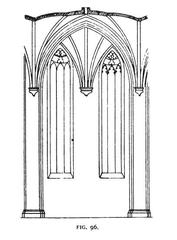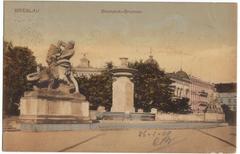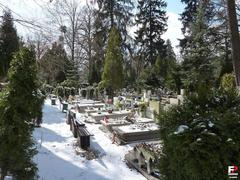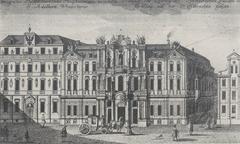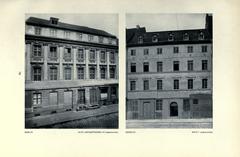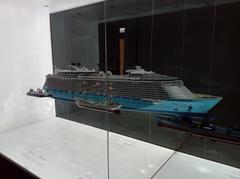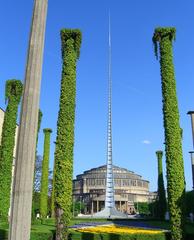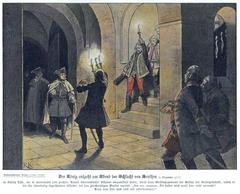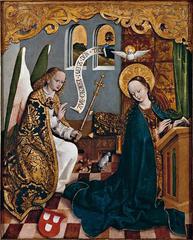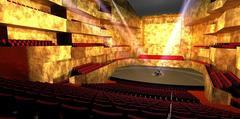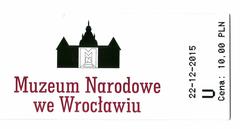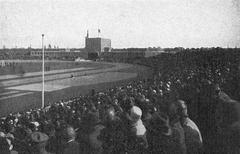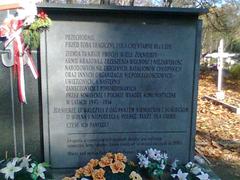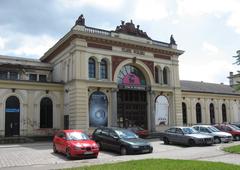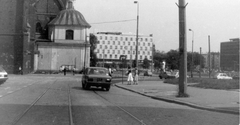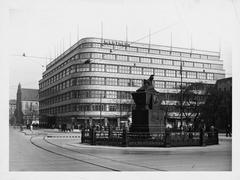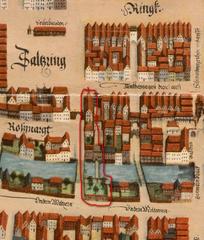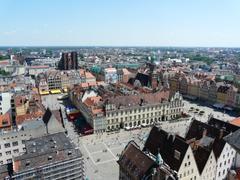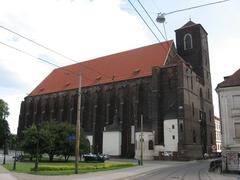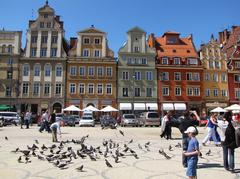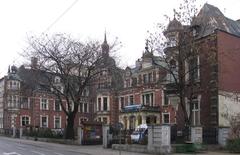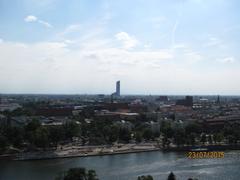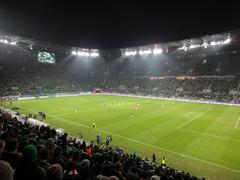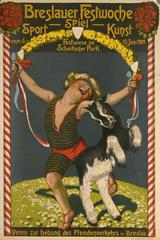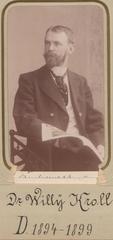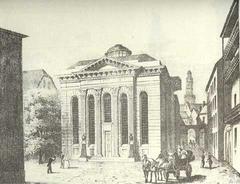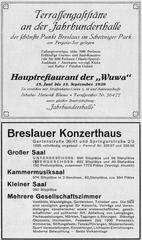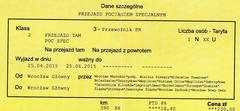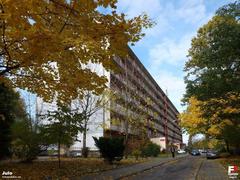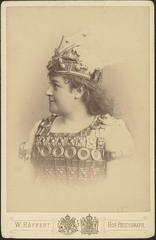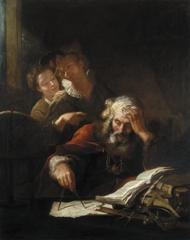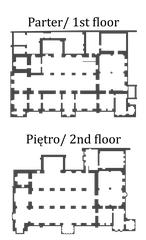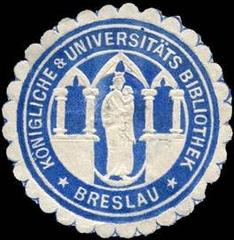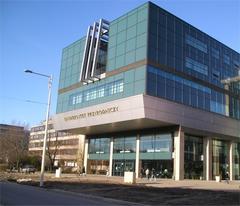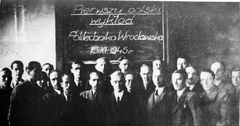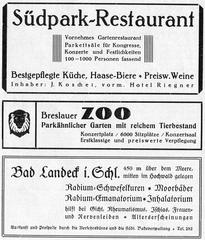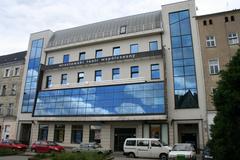Visiting the Zulzer White Stork Synagogue in Wrocław: History, Hours, Tickets & Practical Guide
Introduction
The White Stork Synagogue (Synagoga Pod Białym Bocianem), historically known as the Zülzer Synagogue, stands at the heart of Wrocław, Poland, as a testament to Jewish resilience, architectural beauty, and multicultural coexistence. Its neoclassical facade, storied past, and vibrant present as a religious and cultural center make it one of Central Europe’s most significant Jewish heritage sites. Whether you are drawn to its architecture, rich history, or vibrant cultural events, this comprehensive guide provides all the essential information for planning your visit, including historical context, opening hours, ticketing, visitor etiquette, and nearby attractions.
Historical Background
Early Jewish Presence in Wrocław
Jewish settlement in Wrocław (formerly Breslau) traces back over 800 years, with the first evidence of a Jewish community established as early as the 12th century. Positioned along vital trade routes, the city became home to a thriving Jewish population that, despite periods of persecution, contributed significantly to Wrocław’s social and economic development (FBK; Biblioteka Nauki).
Evolution of Synagogues and Community Life
By the 14th century, archaeological findings confirm the existence of synagogues in Wrocław, reflecting a well-established Jewish presence (JGuide Europe). The community’s fortunes fluctuated through the centuries, but the 18th and 19th centuries, particularly under Prussian rule, saw a period of prosperity and integration. By 1925, Wrocław had one of the largest Jewish populations in Germany, fostering a rich cultural, religious, and scholarly environment (FBK).
The White Stork Synagogue: Architecture & Restoration
Architectural Highlights
Completed in 1829 and designed by Karl Ferdinand Langhans, the White Stork Synagogue is an exemplar of neoclassical architecture, characterized by its harmonious proportions, symmetrical façade, and restrained ornamentation. The building’s light plaster exterior, tall arched windows, and modest entrance allowed it to blend into its urban surroundings, earning its poetic nickname (Visit Wroclaw; Secret Attractions).
Inside, the synagogue features a spacious prayer hall, women’s galleries supported by columns, and intricate stucco work. The restored bimah (central platform) and aron kodesh (Torah ark) reflect the blend of religious symbolism and artistic detail. Neo-Romantic renovations in 1905 added decorative flourishes, while modern upgrades ensure comfort and accessibility (Academia.edu).
Survival, Decline, and Revival
Remarkably, the White Stork Synagogue survived Kristallnacht in 1938 due to its proximity to residential buildings. During WWII, it was desecrated and repurposed, later serving as a gathering point for Jewish deportations (New York Jewish Travel Guide). Post-war, the synagogue fell into disrepair and was closed in 1966. Meticulous restoration began in the late 1990s, culminating in its reopening in 2010. Today, it stands as one of the most faithfully restored pre-war Jewish religious buildings in Poland (Visit Wroclaw).
Cultural Significance
Multicultural Symbolism
The synagogue is located in Wrocław’s Four Denominations District, an area emblematic of interfaith coexistence, home to Catholic, Lutheran, Orthodox, and Jewish places of worship (Biblioteka Nauki). This district symbolizes the city’s centuries-long tradition of multiculturalism and dialogue.
Community & Cultural Life
Beyond its religious function, the synagogue hosts a wealth of cultural programming—concerts, exhibitions, lectures, and festivals celebrating Jewish heritage and promoting intercultural understanding. The annual Jewish Culture Festival and the Days of Mutual Respect are major highlights, attracting visitors from around the world (Bente Kahan Foundation; Academia.edu).
The Jewish Information Center within the synagogue complex features exhibitions on Jewish history, the Holocaust, and contemporary Jewish life, and offers resources for genealogical research and education.
Visiting Information
Location & Access
- Address: 7 Pawła Włodkowica Street, 50-072 Wrocław, Poland (ITS Poland)
- District: Four Denominations District, a short walk from Old Town and accessible via public transport.
- Access: The entrance is through a tranquil courtyard. The site is fully wheelchair accessible, with ramps, elevators, and accessible restrooms.
Opening Hours
Typical visiting hours (ibnbattutatravel.com; Bente Kahan Foundation):
| Day | Hours |
|---|---|
| Monday | Closed |
| Tuesday | 10:00 am – 5:00 pm |
| Wednesday | 10:00 am – 5:00 pm |
| Thursday | 10:00 am – 5:00 pm |
| Friday | 10:00 am – 4:00 pm |
| Saturday | Closed (Shabbat) |
| Sunday | 10:00 am – 4:00 pm |
Hours may vary on Jewish holidays or during special events; check the official website before your visit.
Tickets & Guided Tours
- General Admission: Around 15–20 PLN
- Reduced: Discounted tickets for students and seniors (ID required)
- Children under 7: Free
- Guided Tours: Available in Polish, English, German, and Hebrew. Advance booking recommended, especially for groups or in peak season (GetYourGuide).
- Purchase: On-site or online via the official website.
Visitor Amenities
- Restrooms: On-site and accessible.
- Gift Shop: Judaica, books, souvenirs.
- Café: Kosher refreshments available during events.
- Accessibility: Ramps, elevators, and trained staff ensure inclusivity.
Events and Exhibitions
The synagogue calendar includes rotating exhibitions, lectures, and the renowned “Summer at the White Stork Synagogue” concert series (Bente Kahan Foundation). Check event listings before your visit for a chance to experience cultural programming.
Dress Code & Etiquette
- Dress modestly (shoulders and knees covered).
- Men may be asked to wear a kippah (provided on-site).
- Maintain a quiet, respectful demeanor; silence phones.
- Photography is generally permitted without flash, but restrictions may apply during services or events.
- No eating, drinking, or smoking inside the prayer hall.
Security
Security checks are standard. Cooperate with staff, and avoid bringing large bags or prohibited items.
Nearby Attractions
Extend your visit by exploring:
- Four Denominations District: Catholic, Orthodox, Protestant, and Jewish sites.
- Old Town Market Square: Historic center, restaurants, and museums.
- Jewish Quarter: Memorials and former Jewish institutions.
- Cultural Venues: Museums, galleries, and academic institutes nearby (GetYourGuide).
Practical Tips for Visitors
- Check event calendars before visiting for special concerts, festivals, or exhibitions (Bente Kahan Foundation).
- Book guided tours in advance, especially during holidays or peak travel seasons.
- Respect Shabbat (Friday evening to Saturday evening) and Jewish holidays; visitor access may be limited.
- Support preservation by purchasing from the gift shop or making a donation.
- Plan your route—public transport and walking are recommended due to limited parking.
Frequently Asked Questions (FAQ)
Q: What are the White Stork Synagogue visiting hours?
A: Open Tuesday–Thursday 10:00 am–5:00 pm, Friday and Sunday 10:00 am–4:00 pm. Closed Monday and Saturday (Shabbat).
Q: Are guided tours available?
A: Yes, in multiple languages. Book in advance via the official website or local operators.
Q: Is the synagogue wheelchair accessible?
A: Yes, with ramps, elevators, and accessible restrooms.
Q: Can I take photographs inside?
A: Photography is allowed in most areas, but flash and tripods may be restricted during services or events.
Q: Are there special events during the year?
A: Yes, including concerts, exhibitions, and festivals like the annual Summer at the White Stork Synagogue.
Q: How do I buy tickets?
A: Tickets are available at the entrance, online, or via authorized tour providers.
Summary Table: Key Visitor Tips
| Aspect | Recommendation |
|---|---|
| Dress Code | Modest attire; men cover head; women cover shoulders/knees |
| Etiquette | Quiet, respectful, no eating/drinking/smoking in prayer hall |
| Security | Cooperate with checks; avoid large bags |
| Accessibility | Fully accessible with ramps and elevators |
| Photography | Permitted without flash; restrictions apply during services/events |
| Guided Tours | Book in advance |
| Ticketing | Buy online, on-site, or through official partners |
| Events | Check calendar for concerts and exhibitions |
References
- FBK – White Stork Synagogue Official
- Secret Attractions – Wrocław Architecture
- ITS Poland – Visitor Guide
- Biblioteka Nauki – Jewish Heritage
- New York Jewish Travel Guide
- Bente Kahan Foundation – Events
- GetYourGuide – Private Tours
Visuals
The neo-classical White Stork Synagogue, a key historical site in Wrocław.
Beautiful restored interiors of the White Stork Synagogue.
Plan Your Visit
For the latest updates on hours, ticketing, and events, visit the official White Stork Synagogue website, download the Audiala app for curated travel content, or follow our social media channels. Embrace the opportunity to experience Wrocław’s living Jewish heritage and support the ongoing preservation of this unique landmark.
